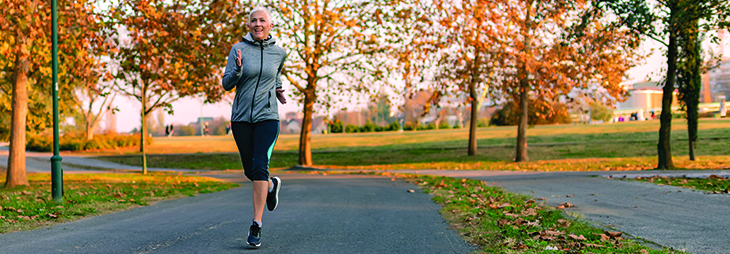
Did you know roughly half of the U.S. population is deficient in vitamin D? The role of vitamin D is threefold. It is a fat-soluble vitamin that functions like a steroid hormone, and is important for bone health, immune system function, heart health and muscle function. It’s also necessary in order for calcium to be absorbed properly in the body. If you don’t maintain strong bone health, you could be at risk for developing osteoporosis. Director of Wellness and Prehabilitation Dr. Eric Martin, PhD, answers questions about this bone disease and how a new DEXA scan, offered at Arkansas Heart Hospital, can assess a patient’s risk.
Q: What is osteoporosis?
A: It’s basically an increased loss of bone mass. One of the interesting things about it is it’s generally asymptomatic, so a lot of times it goes undetected until someone gets a fracture.
Q: Why are women at an increased risk for osteoporosis?
A: They are at higher risk because generally, they don’t have the same amount of bone mass that men do. After a woman goes through menopause, there is an accelerated bone mineral density loss in a three to five-year period.
Q: Are there any preventative measures women can take?
A: The two primary things we look at are exercise and nutrition. Exercise will help keep bones very strong. It’s very important to have a healthy habit of daily exercise. On the nutrition side, you need to be getting enough calcium & vitamin D, so that the body absorbs calcium the way we need it to.
Q: Is one type of exercise better than another?
A: Strength training puts different stressors on the bone. When we work with an individual, we want to put the mechanical stress on the bone from different angles than they are used to, to help it become stronger. Resistance training and weight-bearing activities are very important for keeping our bones strong.
Q: If you’ve had a fracture, what questions should you ask the doctor?
A: We need to be talking about our calcium levels. There are plenty of medications that can be prescribed. I’m a fan of doing it through dietary means because there is an increased risk for cardiovascular disease with increased calcium supplements. Research doesn’t show the increased risk when you do it through dietary methods.
Another question to ask is, “What are my vitamin D levels?” Vitamin D will help the body pick up the calcium the way it needs to for the bone support.
Q: What advice do you have for older women?
A: Get on a planned exercise program. If you’re not sure how to do that, we’re here to help. Frailty is something we look at with cardiac rehabilitation. A lot of those who come in who might be considered frail are going to have osteopenia. Some have osteoporosis and we don’t do any flection exercises with the back. For those individuals, the highest risks are for fractures in their wrists, hips and lower back. So there is some direction that needs to be done to help those individuals exercise safely.
Q: What is osteopenia?
A: It’s a precursor to osteoporosis. Osteopenia is low bone mineral density, but not quite to the point where we can call it osteoporosis.
Q: What about men, are they susceptible to osteoporosis?
A: Yes, men are, too. We recommend about 1,000 milligrams of calcium a day for men aged 19-50 and 1,200 milligrams a day for men over 50. We know from research that if a man has osteoporosis and falls and breaks his hip, he is twice as likely to pass away from that than a woman is.
Q: What is the connection between a broken hip and death?
A: When you break your hip, it’s a very traumatic event and it keeps you down for a long time. It’s very hard to get back. So even with all the advances we have, for some individuals, it breaks them down and they are not able to come back from it.
Q: Is osteoporosis hereditary?
A: It can be. One of the risk factors they look for is if a first degree family member has a fracture. If so, you would be considered high risk.
Q: How are the new DEXA scans at Arkansas Heart Hospital beneficial?
A: A DEXA scan is a non-invasive scan which measures bone mineral density and assesses a person’s body composition and risk for osteoporosis. Bone density scans require a physician referral, so talk to your doctor to see if a bone density scan is right for you. For more information, call (501) 978-3780.
For more information on how to live a healthier lifestyle, check out our heart health tips. You can also find more interviews with our our top heart physicians for other important insights.